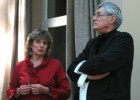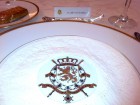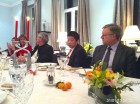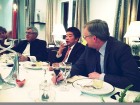Further to my previous post on real estate, here an interesting update on market trends. There is a growing conflict between the rising rent and the survival of the service sector and offices. A number of restaurants use space that can be either for office or other purposes. Just check the subsequent locations of the well-known restaurant MARE. The previous location is now HSBC…
“Office rents under pressure as vacancies rise”
Source: FCCC Newsletter No 303, 11 February (FLANDERS-CHINA CHAMBER OF COMMERCE)
Office vacancy rates in China will continue to rise in 2013, with rents under pressure after skyrocketing over the past few years, international real estate service provider CBRE said.
Beijing’s rent growth of Grade A offices is expected to slow to about 5% in 2013, as elevated rent levels have decreased tenants’ affordability dramatically over the last three years, Savills said in a report. Grade A office rents in Beijing increased by 0.9% in the fourth quarter of 2012 to CNY317.8 per square meter per month, with annual growth falling to 13.8% from 44.2% in 2011, the report showed. “A number of landlords began to offer more rental incentives to combat slowing demand and retain existing tenants, given the current sluggish economy,” said Joan Wang, head of research at Savills Beijing. The demand for office space across China continued to decrease in 2012 due to a sluggish economy, with net absorption falling by more than 40% year-on-year, statistics from CBRE showed. Many multinational companies suspended their expansion plans in China in 2012, as well as a number of Chinese companies. The amount of new supply decreased by 30% year-on-year. Against a backdrop of significant decrease in demand, vacancy rates increased to 12.8% in 2012, marking the first rise of 1.1 percentage points year-on-year after three consecutive years of decline.
Property: a way to spend the dirty money in China
“Crooked cadres in China prone to hide their dirty money in property”
“Luxury flats are a relatively easy and inconspicuous place to conceal dirty money”
By Jane Cai in Beijing, SCMP, 7 February, 2013
http://www.scmp.com/news/china/article/1144893/crooked-mainland-cadres-prone-hide-their-dirty-money-property
The cancer of corruption is showing its impact on society but people are finding out (finally). The corrupt distort the real estate market, buying properties in bulk, driving prices up, leaving apartments (and even office space) vacant in large quantities. Then we are told there is “high occupancy rate” (of the ones on the market for rent!). Rental prices have gone up in Beijing as a result, making life very difficult for migrant workers who do not have the possibility to buy something (restrictions and too expensive). Service people are harder to get here as they cannot cope anymore with the rising costs. Restaurants, shops and offices are closing down, or move to other locations as rents are too high. I know several restaurants who were successful but had to give up; some had their rent increased by 300%. It is simply unsustainable. The corrupt not only rob the people, they also poison society. How can one still respect the officials if this is not cleaned up?
Yesterday we were driving way out of the city, to the north. I was looking at the rows and rows of huge apartment complexes. Just wondering: they might be all sold, but how many are actually inhabited?
I am told office space is tight. Then why do I see all those vacant spaces in the different SOHO complexes? The explanation: owners do not bother to rent them out. Or their conditions are unrealistic.
IHT/NYT: still clueless about Beijing 2008 Games
Lofty Games vision, grim reality?
I refer to the article by David M. Herszenhorn – 8 February 2013 (IHT version)
On the New York Times website:
“Putin’s Vision of Olympic Glory Meets a More Earthbound Reality in Sochi”
By DAVID M. HERSZENHORN
Published: February 6, 2013 (NYT)
http://www.nytimes.com/2013/02/07/world/europe/putins-vision-of-olympic-glory-meets-reality-in-sochi.html
The article mentions US$42 billion spent for the 2008 Beijing Games. The figure is totally wrong, as it happens very frequently in the media. My estimate for the real cost is well below $10 billion. Journalists still cannot distinguish between investing in a new subway line and running the Olympic show. I hope his figures for Sochi are more reliable. Having worked inside the Beijing Government I have a pretty good view on the real cost of the Olympics, except for the part related to security (e.g. police forces, army and related).
Beijing did not even have a budget to build the stadiums: this is the reason why they called me. Find us the money, they told me. So we did. The city proper spent little for all the venues, except for the Bird’s Nest: they bought back the investment done by the private sector. The Watercube: donation by overseas Chinese. And so on.
Not to wonder why people still ask me to give seminars on the issue.
As for Sochi: a different case, they building stuff that will have little or no use in the future. That is real waste.
Entrevista: “Sala de Visitas” da CRI
Hoje, na Casa Brasil (en frente da embaixada do Brasil), o José da Radio Internacional da China (CRI, China Radio International) me convidou para um almoço bem brasileiro, junto com amigo dele (Rafael, professor de português), para fazer uma entrevista.
A Radio tem um programa de entrevista chamado Sala de Visitas. O departamento em português da CRI é bastante importante: 20 pessoas locais mais 5 estrangeiros (2 do Brasil, 3 do Portugal).
É um programa de 15 minutos transmitido semanalmente para os países que falam português. Além disso, o programa é reproduzido em Portugal por uma rádio FM local e disponibilizado também na internet.
A pauta da conversa:
1- A minha vivência no Brasil e na China
2- O Livro Capitalismo Tóxico
3- Os desafios do governo chinês em relação a questão ambiental.
Achei a conversa legal, a comida boa e felizmente tive duas (boas) caipirinhas para facilitar o papo.
Estou esperando o link!
Kashin-Beck Disease Foundation
On 31 January, the Belgian ambassador Patrick Nijs organized a dinner at his residence to welcome Mrs. Françoise Mathieu, the Director of Programs for the Foundation. Kashin-Beck disease (KBD), also known as ‘Big Bone Disease’ is a disabling disease of the bones and joints that leads to stunted growth and deformity of the joints. It mainly affects remote, rural populations and is very much a “disease of the poor”.
See their website www.kbdfund.org for more details.
It was the second dinner organized to meet the team that has been involved in research, treatment and prevention of this rare disease. The Foundation is one of the very few NGO with an office in Tibet, where today most of the KBD cases occur.
Among the guests was the Chairman & President of AIGO, Mr. Feng Jun, as well as the leaders of Tianjin Liho I&E Company. Both companies are very active in Belgium.
Françoise gave a presentation on the disease and we then all discussed further over dinner.










